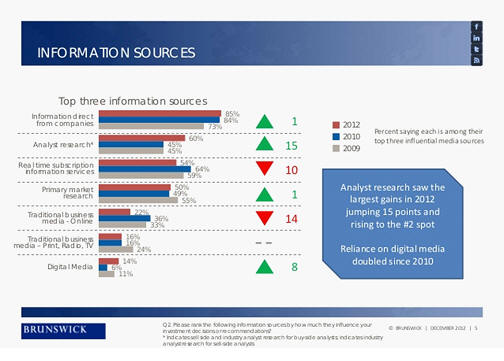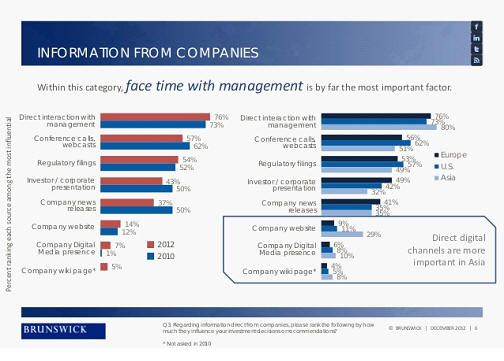|

|
Social media fail to replace direct
company contact |
|
by
Garnet Roach |
|
Digital and social media
make gains but direct company information remains most important
Social media are becoming
increasingly important, according to new research, but have done
little to tear investors away from their primary source of
information: companies themselves.
There’s no doubt the investment community is embracing social media;
more than 200,000 investors, market professionals and public companies
now share information through StockTwits, according to the company,
which was launched in 2008, and Twitter got its own trading platform
earlier this month in the form of DCM Dealer.
In fact, investor
interaction with digital and social media is increasing
‘substantially’, according to new research from the Brunswick Group.
Of almost 500 investors and sell-side analysts in Europe, the US and
Asia surveyed by Brunswick, more than half read blogs, a quarter use
social networks and 30 percent now use Twitter – a 19 percentage point
increase since the study was last conducted in 2010.
‘Use and engagement of digital and social media among those in the
investment community is increasing rapidly,’ says Rachelle Spero,
partner at Brunswick, in a company press release.
‘More telling, however, is that their influence on investment
decisions continues to grow, too. Now, a quarter of those surveyed say
they have made an investment decision or recommendation after
initially reading a blog. For Twitter, that figure is one in eight, up
considerably from our last survey two years ago. This suggests now is
the time for companies to adopt digital and social media for
investor-related content distribution and influencer engagement.’
Overall, digital reliance has doubled since 2010, says Brunswick, with
the big push coming from Asia, where investors are more likely than
counterparts in the US or Europe to take action based on digital
information or to rely on a digital relationship with a company.
‘The intensive use of social media as an information channel in Asia
is a surprise to me,’ says Patrick Kiss, investor relations expert and
founder of the IR Club in Germany. He adds that the US ‘as creators of
most of the social media tools’ is lagging behind.
Spero says this can be explained to some extent by demographics.
‘Asian populations tend to be much younger than the rapidly aging
populations in the West. Our data shows investors surveyed in Asia as
being a little younger than those in Europe or North America,’ she
says, adding that the blocking of social media networks by some
companies in the US ‘for a number of reasons including legal,
regulatory, and security’ could also have an impact.
Almost a quarter of Asian investors and analysts say information
posted on a micro-blogging site – such as Twitter – has led to an
investment decision or recommendation, yet the same is true for only 4
percent in the US. A similar gap can be seen when it comes to social
networks, though the gulf closes to 28 percent for Asia and 24 percent
in the US when it comes to blogs.
While Brunswick reports that 86 percent of investors say online
resources have become more important this year, it seems nothing can
replace traditional sources. More than half (57 percent) still rank
‘information direct from the company’ as the biggest influence on
their investing decisions, while 85 percent put it in their top three
– an increase from 84 percent in 2010 and 73 percent in 2009.
Unsurprisingly, access to senior management is the most important
factor within this category. This compares with 14 percent who place
‘digital and social media’ in the top three most influential sources,
up from 6 percent in 2010.
Kiss says it is no surprise investors want information direct from
companies. ‘This was and always will be the best, unfiltered source,’
he explains. ‘But only institutional investors have the chance to meet
the CEO in person. Social media could be tools for investor democracy,
a direct way to inform 85 percent of private investors, too.’
With the clearly growing importance of social media, Kiss adds that
changes in information dissemination can take time and a breakthrough
could be on the cards. ‘In former times companies sent out faxes;
nowadays they email information,’ he says. ‘Maybe in the future
they’ll tweet.’
©
Copyright Cross Border Ltd. 1995–2013. All rights reserved. |

